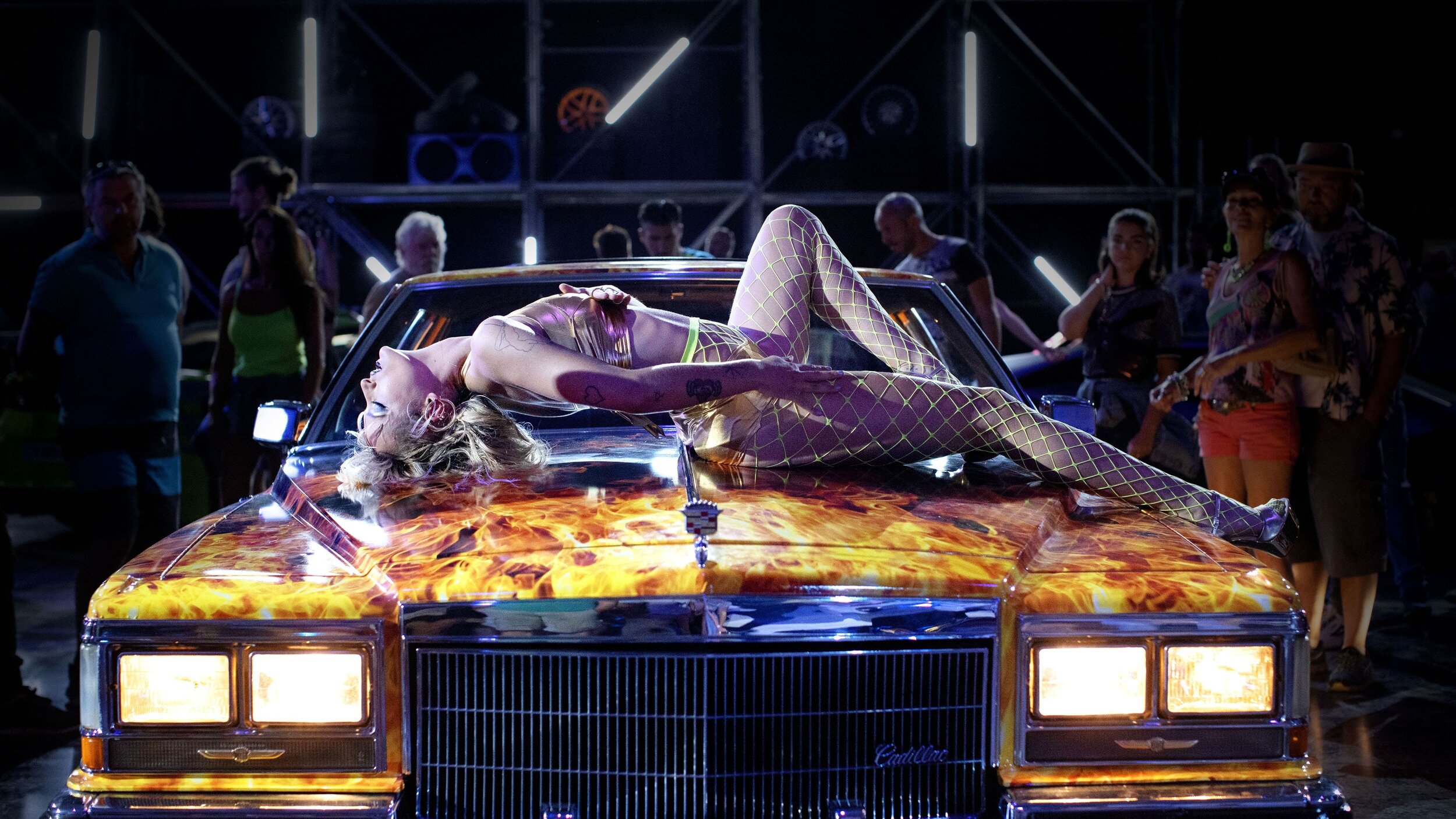Titane
ALTITUDETitane is a body horror film coming from France’s most promising young director: Julia Ducournau. Her first short film, Junior, won the Small Golden Rail at the 2011 Cannes Film Festival, a coming-of-age story that compares gross bodily transformations with the unpredictable changes of female puberty. Then, she caught every cinephile’s eyes with her debut feature, Raw, winner of the FIPRESCI prize at Cannes 2016, and garnering international acclaim from critics and audiences alike. There, a young girl’s sexual awakening is explored metaphorically through cannibalism. It is safe to say that Ducournau loves bodies, and just how gross and disgusting they can be, and Titane has plenty of moments that would make king of body-horror cinema David Cronenberg blush.
Despite coming almost twenty years since the New French Extremity film movement started – thanks to controversial auteurs like Gaspar Noé, Bruno Dumont, Claire Denis, and Alexander Aja – Ducournau’s creation shares many of the same provocative elements of the works of her compatriots. Calling Titane “boundary-pushing” would be an understatement, as the first 20 minutes feature enough moments of violence and sexuality – often mixed together – to prompt many noises from the audience, as well as a couple of understandable walk-outs from people who likely were expecting a more conventional Palm d’Or-winning film, instead of this batshit ride.
Vincent Lindon’s homonymous fireman is a depressed man, injecting himself with an unknown substance, putting his life on the line every day to escape the pain inside of himself. Finding his missing son, 10 years after his disappearance, gives him a shot at leading a normal, more serene life again. The two share an unspoken bond that encapsulates what it means to be both father and child, drawing each other close while simultaneously wanting to push each other away. It is one of many contradictions in life, and there is something incredibly tender in how the relationship between the two develops in the film: what at first seems like a rapport bound for catastrophic consequences, it becomes clear that they both need each other to survive the pain of daily life.
Newcomer Agathe Rousselle plays Alexia, a woman with an event in her childhood that severely traumatised her, leading her down a dark path. The way her narrative unfolds forces her to hide her womanness from the others. While at first it may seem like many other stories about girls pretending to be men, it becomes clear that there is much more at play here. Not only can the film be seen as an analog to transgender awakening, but more fittingly it works as a non-binary tale.
Many moments that could have been exploitative or derisive of these individuals actually end up feeling empowering, a reminder that horror films are one of the major outlets for queer stories. For instance, Alexia wrapping herself up in tape to make her figure more masculine mirrors a non-binary person taking extreme measures to remove the features of their gender, leaving painful bruises all over their body.
Vincent and Alexia only want to love and be loved for who they really are, and even the fleeting side characters seem to be looking for that same thing. After all, that is what most of humanity is searching for: love. Some that can make them feel wanted, like their life is worth something. It might seem odd that a film that features gruesome kills with a hairpin and freaky sexual encounters with cars can also be an emotional and wholesome exploration of the endless pursuit of affection, yet Julia Ducournau’s multi-layered script makes it work in ways that are astonishing. The fact that, in the span of 15 minutes, the narrative goes from gnarly body horror to an impromptu dance scene, only to double down on the violence, and for it all to feel organic and actually meaningful, is quite an achievement. It is not surprising that quite a few audience members got emotional during the last few minutes of the film.
Titane utilises songs like “Nessuno Mi Può Giudicare” and The Zombies’ “She’s Not There” in fun ways that seemingly come out of nowhere, injecting much-needed levity that is really effective, jolting viewers in their seats, while also employing an original score by Jim Williams that adds an operatic quality to the events – including an adaptation of “Sarabande” that is impeccable. The best type of feeling during a film like this is laughing at what is happening, never sure what is meant to be funny and what is not. What shocks someone can humour another, and that happens plenty of time during Titane, what with its insane bursts of violence and nudity that put the so-called “elevated” subgenre of horror to shame for how often they skimp out on this level of thrills and absurdity. Rather than blatantly explaining the film's themes and giving easy-to-digest answers, Ducournau leaves viewers with even more questions than when the movie began, all the while creating a world full of memorable iconography that goes beyond anything that is being produced overseas. Not since John Wick: Chapter 2 has seeing a person's ear penetrated with a sharp object led to nervous laughter from audience members.
Delightfully twisted and sick, while also deeply heartfelt and brimming with passion, Julia Ducournau crafts a film that is intoxicating to watch, shocking the system in ways that can remind cinephiles why such bold, risky, and odd films are needed nowadays. They can remind people about their own humanity, their weaknesses, and that everyone is looking for the same thing, regardless of gender or sexuality. When someone to love is found, they should be loved back and never let go, be they father figures, unwanted children, or beautiful cars with flames on their side.


